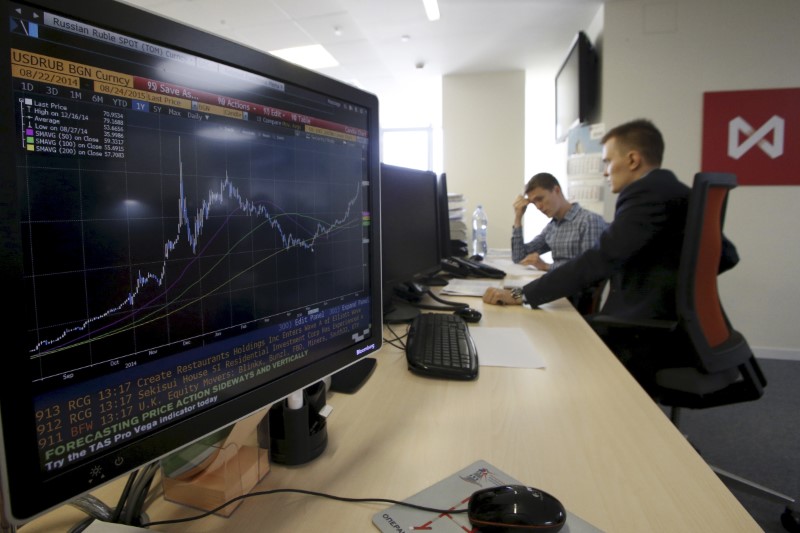By Zlata Garasyuta
MOSCOW (Reuters) - Russia's stock market is seen posting moderate gains for the rest of 2018, shrugging off the likely re-election of President Vladimir Putin but kept in check by tepid economic growth and geopolitical risks, a Reuters poll found.
The dollar-denominated benchmark RTS index (IRTS) is seen rising to 1,356 points by the end of the year, 2.7 percent higher than Tuesday afternoon's levels, according to the consensus forecast of market analysts.
The market's upside has vanished compared with the week to Feb. 23 when the poll was held, as the RTS rallied to 1,339.4 on Monday, its highest since mid-July 2014, pricing in Russia's sovereign rating upgrade by S&P Global.
By the middle of the year the index is forecast to be sitting at 1,320, according to an average forecast of five out of 10 analysts polled. The last poll, conducted in October, predicted the RTS would be at 1,151 by the middle of 2018.
Any change to the Western sanctions on Russia first imposed in 2014 for Moscow's role in the Ukrainian crisis could of course alter the market's prospects.
On the other hand, a presidential vote on March 18 where Putin is widely expected to secure another term is unlikely to cause major market moves, analysts said.
"We expect a neutral dynamic on the Russian market as the presidential election theme worries the market slightly. We are unlikely to see major moves after the election: Foreign investors got used to one surname," said Victor Veselov, chief analyst at Globex Bank.
Danske Bank said it anticipates no rally on the Russian market this year but a gradual increase after the U.S. Treasury department advised against imposing sanctions on holdings of Russian state debt earlier in February.
"It is important to avoid sparks of geopolitical conflicts as in this case, unfortunately, risks can be only negative," said BCS analysts.
Analysts in the poll also said they expected to see support for the stock market from the central bank's monetary policy. The bank is seen cutting interest rates further, making lending cheaper and thus supporting economic activity and demand.
The Russian economy grew 1.5 percent in 2017, below the global average, after two years of recession caused by a slump in prices for oil, its key export, and Western economic and financial sanctions.
Prices for oil remain in focus after Brent crude futures (LCOc1) exceeded $70 per barrel in early 2018, up from around $55 in the same period a year earlier.
"If there is no substantial decline in oil prices, market participants will increase their profit forecasts," said Andrey Kuznetsov, a strategist at Sberbank CIB.
"According to our estimates, the market on average is pricing in an oil price of $55 a barrel," Kuznetsov said.

(To read other stories from the Reuters global stock markets poll)